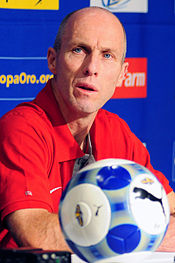
Thought you'd never ask. First let's take a look at the teams that are already through as of Monday, Oct. 12, 2009 (in no particular order):
South Africa, Germany, Spain, Italy, Serbia, Holland, Denmark, England, Mexico, USA, Brazil, Paraguay, Chile, Ghana, Ivory Coast, Australia, Japan, South Korea, North Korea.
Serbia is quite possibly the biggest surprise there. The
Beli Orlovi played in their first qualifiers as an independent nation and obviously made it count, finishing ahead of 2006 World Cup finalists France. Then there is Chile, who were last seen on this stage in 1998. The
Roja are a young side with few recognizable stars and only a handful of players who earn their money in Europe. But they nevertheless managed to beat Argentina twice and Brazil once in qualifiers and may very well be a force to be reckoned with in South Africa next year.
Beyond that, the following teams have qualified for, or are (in one instance) already playing in tie-breakers:Bahrain, New Zealand, Bosnia-Herzegovina, Russia, France, Ireland, Switzerland, Greece, Slovakia, Costa Rica, Honduras.
Among these, Switzerland or Greece, Slovakia, Costa Rica or Honduras could still qualify directly depending on the outcome of the last round of games in their group. Bahrain and New Zealand are in the middle of their tie-breaker. The first leg, at Bahrain, ended scoreless. The second will take place at New Zealand this Saturday. Of course neither of these teams will have a chance at advancing past the first stage at the actual World Cup, but that's okay. We need them there too.
Now let's take a look at teams who "control their own destiny" in the last round of games. A win and they're in:Switzerland (host Israel Wednesday. Actually only need a point from that game), Slovakia (play at Poland Wednesday), Argentina (at Uruguay Thursday), Uruguay (host Argentina), Costa Rica (at the U.S. Thursday), Cameroon (at Morocco Saturday), Tunisia (at Mozambique Saturday), Algeria (at Egypt Saturday. According to my calculations as long as Algeria don't lose this game by four goals or more they're in), Egypt (host Algeria Saturday and need to win by four goals or more).
The following teams can still qualify directly but need help:Greece (must beat Luxembourg and hope Switzerland lose to Israel);
Slovenia (must win at San Marino--what are the chances of
that happening?--and hope Slovakia lose or draw at Poland. Yes, Slovenia and Slovakia really are two different countries. I should know, I've been to both places. Honest);
Nigeria (must win at Kenya and hope Tunisia lose or draw at Mozambique);
Gabon (must win at Togo and hope Cameroon lose or draw at Morocco);
Honduras (must win at El Salvador and hope Costa Rica lose or draw at Washington, D.C.);
Ecuador (must win at Chile by five goals or more and hope Uruguay and Argentina draw).
These teams can make the play-off by their own power:Portugal (must beat Malta at home Wednesday);
Slovenia (must win at San Marino);
Ukraine (must win at Andorra);
Ecuador (must win at Chile).
These teams can make the play-off but need help:Sweden (must beat Albania and hope Portugal draw or lose to Malta);
Israel (must win at Switzerland and hope Greece somehow lose or draw at home to Luxembourg. Hey, if Switzerland did it...);
Croatia (must win at Kazakhstan and hope Ukraine somehow lose or draw at Andorra);
Czech Republic (must beat Northern Ireland and hope Slovenia somehow lose or draw at San Marino).
The following squads are eliminated all but mathematically, facing essentially insurmountable hurdles just to make the playoffs:Hungary (must win at Denmark by at least seven goals, hope Portugal lose at home to Malta and Sweden draw or lose to Albania at home);
Venezuela (must win at Brazil by a high score, hope Ecuador lose at Chile and hope Argentina beat Uruguay by a high score. With a 15 goal difference between Uruguay (+9) and Ecuador (-6) this is effectively impossible because it means Venezuela will need to win at Brazil by, say eight goals while hoping Argentina defeat Uruguay by eight goals. Ain't gonna happen);
Northern Ireland (must win at Czech Republic by a wide margin and hope Slovenia lose at San Marino by a wide margin. The combined margin of a N'Ire win and Slovenia loss must be at least seven goals).
Lastly, let's look at some possible playoff ties:Portugal vs. France
Ukraine vs. Russia
Bosnia vs. Greece
Argentina vs. Honduras
Uruguay vs. Honduras
Ireland vs. Slovakia
Russia vs. Bosnia
Greece vs. Russia
 To echo our host's views on this, what took place between France and Ireland on Wednesday night really was a travesty. And lo and behold, here to rub salt in still-fresh wounds is soccer's top authority, FIFA.
To echo our host's views on this, what took place between France and Ireland on Wednesday night really was a travesty. And lo and behold, here to rub salt in still-fresh wounds is soccer's top authority, FIFA.




